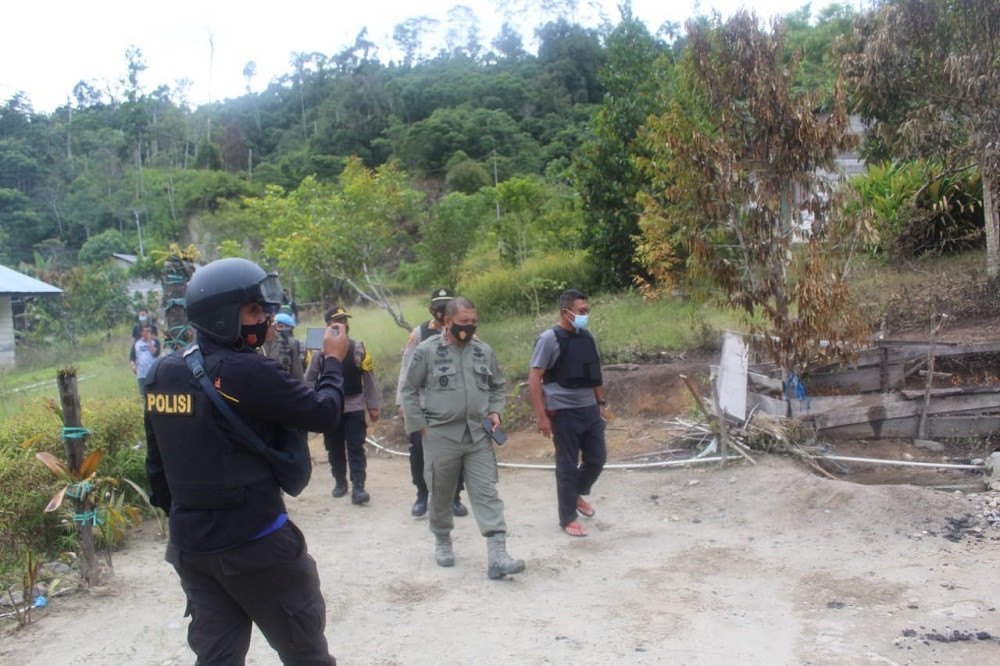How the nation should respond to the Sigi terror act
Despite the savagery of the terrorist attack, the condemnation expressed by state officials in public has been relatively mild.
Change Size

V
iolence appears to have never ceased in Poso and its neighboring areas in Central Sulawesi, the hotbed of the 1999-2000 sectarian conflict. Last Friday, residents of the remote village of Lembantongoa in Sigi regency were shocked by the brutal killing of four members of one family.
Based on the pattern of the attack, the police suspect that the perpetrators are members of the Poso-based East Indonesia Mujahidin (MIT) terror group. Witnesses said that about six people carried out the attack.
Members of the police and military have been deployed in the Tinombala joint operation to hunt down the perpetrators of the killings, after previously focusing their efforts on capturing the MIT members remaining around Poso.
Despite the savagery of the terrorist attack, the condemnation expressed by state officials in public has been relatively mild. Three days after the incident, President Joko Widodo denounced the attack on TV and tweeted on his account, responded to public demands in the aftermath of the Sigi killings.
The silence is ironic when compared to the hyped reactions from both the government and civil society groups, including Muslim organizations, to French President Emmanuel Macron's remarks on his government’s strategy to manage Islamist separatism in the country, following the beheading of a teacher by a man who accused him of offending Islam.
This cold reality could be understood in two ways. First, the central government is distancing itself from condemning directly the killing of four Christian citizens. Any strong statement in defense of the Christian victims is feared to provoke sectarian tension, an assumption that is actually inherited from the New Order literature.
In reality, a deep rift has formed among locals who bore the historical ethnic and religious conflicts of Indonesia’s post-1998 democratic transition. The acts of terror perpetrated by the MIT could widen this divide, particularly between Muslims and Christians in Central Sulawesi.
Thus, the four victims have not ignited comprehensive and immediate sympathy, unlike the victims of the Surabaya church bombings in 2018. For one, Surabaya is the country’s second largest city and is thus politically significant for maintaining the good image of both the central and local governments. The remoteness of Sigi seems to be a factor that has alienated the logical responses from the elite in the central government.
Second, the Sigi incident could potentially undermine years of tracking down the remaining members of the MIT terrorist group. In January 2016, the National Police and Indonesian Military launched the Tinombala operation to hunt down MIT leader Santoso and his followers, who had pledged allegiance to the Islamic State in Iraq and Syria (ISIS).
Santoso was killed and his right-hand man Basri was arrested in the crackdown in July 2016, but the remaining members of the group have continued to spread terror under Ali Kalora. In December 2019, the group shot dead a member of the police’s Mobile Brigade unit. Police spokesman Brig. Gen. Argo Yuwono said that security personnel found difficulties in quelling the terror group due to geographical challenges, including a blank spot area.
The authorities captured Ali’s wife in August this year, but the whereabouts of her husband and the rest of the group have remained unknown because of their guerrilla tactics and the pattern of their attacks that target isolated places.
At international and regional forums, Indonesia has always been keen to become part of Countering and Preventing Violent Extremism (CPVE) efforts. Recently, during its presidency of the United Nations Security Council, Indonesia took the initiative by drafting a resolution on the prosecution, rehabilitation and reintegration of foreign terrorists, which was eventually vetoed by the United States.
At the regional level, Indonesia and other ASEAN states are also aware of the need to establish more concerted efforts to tackle terrorism following the defeat of ISIS.
The Indonesian government and security forces should look for the roots of the problems, identify gaps in policy execution and improve intra-agency coordination, especially between intelligence and operation agencies as part of the measures to act against terrorist groups like the MIT.
Now that we have amended the Terrorism Law, the security authorities have a strong legal basis to take firmer actions against terrorists and whoever assists and facilitates them. Technology will matter in locating terror suspects to mitigate terrorism in isolated areas.
While the manhunt is underway, the government and civil society organizations at local or national levels must work together to immediately help address the trauma of the Sigi victims’ families and surrounding communities.
Learning from the Sigi incident, community and religious leaders and other civil society groups need to become involved in measures to prevent violent extremism. Terrorism is an inhumane action and dealing with it requires the involvement of all element of the nation.
The public needs to push the government to find proper solutions to terrorism to prevent the Sigi incident from recurring throughout the country.
***
The writer is PhD candidate at the Gender, Peace and Security Centre, Monash University.









